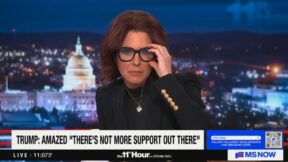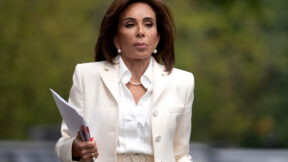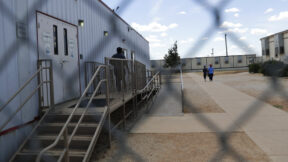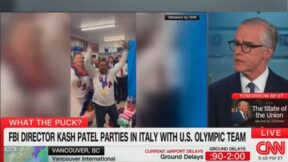‘You’re Wrong’: Chris Wallace Grills Nikole Hannah-Jones on Slavery Facts in 1619 Project
In his interview with Nikole Hannah-Jones on CNN+, host Chris Wallace challenged the 1619 Project creator on some of the facts, and an underlying premise, of her work regarding slavery and the American Revolution.
The in-depth interview for Who’s Talking to Chris Wallace covered many aspects of both Hannah-Jones’ work on the project and the broader state of affairs in the U.S. At one point, Wallace zeroed in on criticisms that Hannah-Jones has committed factual errors in making her case.
After Hannah-Jones talked about having given “ammunition” to critics with the structure of her original essay, Wallace responded that it wasn’t just a matter of selectiveness but, in some cases, omission or error.
“I think in some cases, you’re wrong,” he said, talking about the overall argument 1619 makes. “You leave out the fact that a number of the founding fathers — John Adams, Alexander Hamilton — were committed abolitionists, you don’t mention the fact in the original essay that the Stamp Act and the Boston Tea Party were — you don’t mention them at all. And those, of course, were huge factors in the American Revolution, and there’s so much else, and so many other people that had nothing to do with slavery.”
“I was making an argument, and I chose which facts I was going to harness towards that argument,” said Hannah-Jones. “This wasn’t a project that was going over the territory we all know. Most Americans know about the Stamp Act. They know about the Boston Tea Party.”
“We have been taught that the center of the American Revolution was Philadelphia and Boston. I disagree. I’m arguing that the center of the revolution was actually Virginia, and then I lay my case out as to why it was Virginia,” she said. “So I didn’t need to write an essay that said they were mad about taxes. That is the common narrative that we know, this is trying to fill in the gaps of the history that we haven’t received before. There were a million facts I could have mentioned. But I was making an argument.”
“But you’re say one of the primary reasons the colonists or some of the colonists decided was because they wanted to protect slavery,” he said.
“Yes,” she replied.
The two proceeded to discuss whether Hannah-Jones had some facts wrong that could change the conclusion drawn.
CHRIS WALLACE: But the Brits weren’t going to take slavery away from them.
NIKOLE HANNAH-JONES: Yes. And neither was when during the Civil War.
CHRIS WALLACE: Well, no, no boy, you stay right stay with it.
NIKOLE HANNAH-JONES: If you have a belief that something is going to happen. It doesn’t matter if it’s going to actually happen or not. Abraham Lincoln had no intention of abolishing slavery, but southern Confederates believed that he was going to abolish slavery. What makes you think that the that the colonists thought that the Brits were going to, we’re going to end slavery in the American colonies in this 1770s.
NIKOLE HANNAH-JONES: Have you read the new essay. Have you read the revised essay?
CHRIS WALLACE: I have. I have.
NIKOLE HANNAH-JONES: So I lay this out. So one we have James Madison saying that he has heard rumors that abolition is coming from the British. We have the Dunmore proclamation where much like when Abraham Lincoln issued the Emancipation Proclamation as a war tactic to turn enslaved people against their enslavers. This is what Dunmore is doing. He’s saying, I’m going to free your enslaved people and I’m going to arm them to fight.
CHRIS WALLACE: I did some research, Lord Dunmore in 1775 issues, a proclamation that says, you know, if there’s going to be a revolution here, we’re going to free slaves, they can they can be freed if they come over and fight for the Brits.
NIKOLE HANNAH-JONES: Yes.
CHRIS WALLACE: Instead of for the colonists.
NIKOLE HANNAH-JONES: Yes.
CHRIS WALLACE: But he wouldn’t have done that. If he didn’t fear that there was a revolution already happening.
NIKOLE HANNAH-JONES: Of course. I’m not arguing that the revolution started in Virginia. In fact, it wasn’t until around the time of that proclamation that we see the first southern battle of the revolution. The scholars, Alan Taylor, two-time Pulitzer Prize winner, Woody Holton, Benjamin quarrels. I didn’t make this up. This is based on research from various themed historians. And it’s been contested in the field. Absolutely. But can you say that I’m wrong? If these are these facts that I’m arguing- I am citing their stories and their scholarship where they have made the argument.
Wallace took a moment to comment on the nature of the interview itself, saying that Hannah-Jones has previously argued that reporters should be skeptical, and therefore should be open to skepticism.
“So, look, this is exactly what I want to do in this show, which is to have respectful, thoughtful conversations. And I read an interview you did some while back in the Hollywood Reporter, where you said reporters should be skeptical,” he said.
“Absolutely,” Hannah-Jones agreed.
“So, I know you were talking about it in terms of being respectable, skeptical of Republican politicians. But we should also be skeptical of Nicole Hannah-Jones, right?” he asked.
“Of course,” she replied. “I’ve endured a lot of skepticism in the last two years.”
Wallace presented his overall point, and Hannah-Jones her counterpoint.
CHRIS WALLACE: Okay, so here’s my, here’s my only point. The Brits do not end slavery and their empire and their colonies until 1833.
NIKOLE HANNAH-JONES: Yes.
CHRIS WALLACE: That is 60 years after all of these events. All I’m arguing is that you say that the colonists declared independence to protect the institution of slavery. I’m saying if you look at what Lord Dunmore did, if you look at what the Brits did in 1833, I don’t think that they were they were trying to free themselves from Britain, because they were worried that slavery was going to be the rug was going to be pulled out from under them. That’s my argument.
NIKOLE HANNAH-JONES: Okay. And I would argue that they were worried about it, that that was a fear. And that, as Woody Holton and Alan Taylor says, for those colonists in the southern colonies, particularly in places like South Carolina, and Virginia, who were reticent to join the revolution, Lord Dunmore, as well as these rumors that they worry that the British were considering ending slavery is what puts them into the pool of the revolutionaries. That’s my argument.
CHRIS WALLACE: Okay. Even if I don’t agree with all of it, I’m really glad you wrote this essay, because this is a good conversation for Americans to have. And frankly, I think, as they are able to handle it, for kids to have.
Watch the clip above, via CNN+.
New: The Mediaite One-Sheet "Newsletter of Newsletters"
Your daily summary and analysis of what the many, many media newsletters are saying and reporting. Subscribe now!






Comments
↓ Scroll down for comments ↓